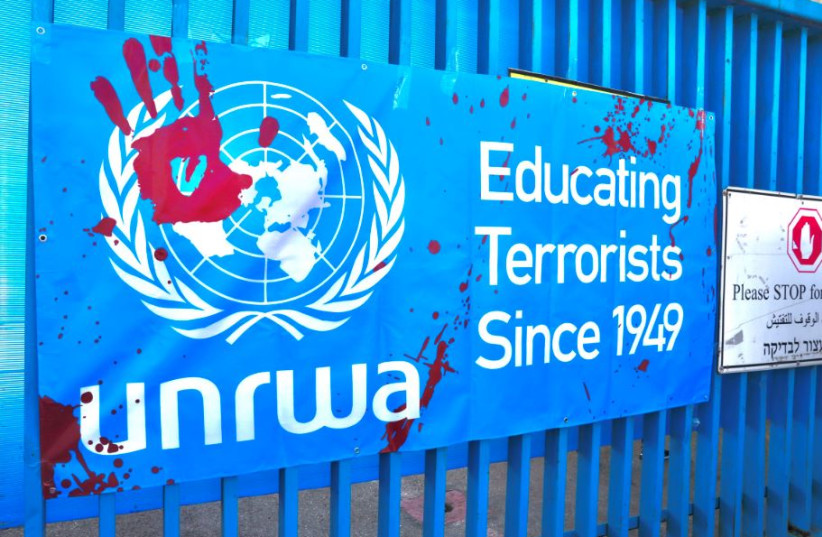A visiting alien will assume that the world’s major refugee problem concerns Palestinians. Other refugees, such as approximately one and a half million Vietnamese following the communist victory in 1975, were absorbed elsewhere and are barely mentioned. In “our” case, a huge effort is made to preserve refugee status, and UNRWA is a vital tool in enabling this. How did this happen? What should Israel do? What does it do?
Two UN agencies deal with refugees. The United Nations High Commission for Refugees (UNHCR) has some 20,000 workers and is responsible for all problems but one. UNRWA, United Nations Relief and Works Agency, employs some 30,000 workers, mostly local Palestinians, and is entrusted with dealing with refugees from the War of Independence in 1948 and the Six Day War in 1967.
In 1949, when Israel supported the establishment of UNRWA, it was supposed to fulfill its goal and disband. Instead, it became a longstanding tool in the service of a different agenda. Hostile Arab countries acted to preserve the refugee problem in order to pressure Israel to enable them to return, thus eliminating the Jewish state by means of demographics. Western countries inadvertently lent a hand by contributing for humanitarian reasons, and this allowed the agency to become entrenched, while deviating from its goal.
It is enough to examine the definition of a refugee in order to understand how this works. UNHCR does not consider a person with citizenship, meaning one who has a country, to be a refugee, while for UNRWA there is no contradiction between being a citizen and being a refugee.
For UNHCR, transferring refugee status is unusual, whereas for Palestinians, it is inherited automatically, to the fourth generation (so far). If such definitions would apply to us, most Israelis would be considered refugees.

It should be remembered that around the establishment of Israel, hundreds of thousands of Jews left their homes in Arab countries and were absorbed in Israel and elsewhere. At the same time, the descendants of a comparable number of Palestinians, many living in camps, remain a stain on the world’s conscience, which in turn points a blaming finger at Israel.
UNRWA has rotted
NO WONDER that an organization which aims to preserve the problem that it was established to serve has rotted. Many of its workers actively undermine Israel, including through direct involvement in terror. Problems like incitement and corruption have long been known and discussed, to little avail. It all blew up, literally, on October 7.
True, UNRWA performs vital civilian tasks, but for the first time the organization was widely seen not only as part of the solution but also as part of the problem. Subsequently, many donor countries suspended their contributions.
In the meantime, while there was broad understanding for Israel’s response to the attack, the world asked and continues to ask about its plans for the day after the war. What are its aims, other than vague slogans? Who will control the area after they are achieved? Who will provide loans to small businesses? Who will maintain medical clinics, deal with sewage? These, after all, are not manna from heaven, to be picked up and used at will.
The threat of the disintegration of the current Israeli government coalition prevents discussion of the day after. The ongoing war, the humanitarian crisis and absence of vision, including any practical suggestions regarding the future of the organization and the services it offers (Should UNRWA be fixed and if so how? Should it be replaced and if so, who is willing and able to do so? Which guarantees are required to ensure that aberrations do not recur?) persuaded most donors to release their suspended contributions.
The problems with UNRWA are not a new revelation. Even before the war, laws were proposed to limit it, and these are proceeding through the legislative channels. Statements by politicians imply that many will not be satisfied with limits and that they aim to close it entirely. In contrast, professionals on the ground seem to understand that there is currently no viable substitute for the services which the agency provides.
It would be an understatement to say that UNRWA is problematic. Current circumstances provide a unique opportunity for a change that will take into account Israel’s needs and its demands. But instead of providing practical suggestions, Israel is satisfied with condemnations. They may be completely justified, but they advance nothing, achieve nothing. Absent initiative and cooperation, we will be obliged to adapt to external decisions.
Foreign minister Abba Eban famously said that the Arabs never miss an opportunity to miss an opportunity. This assessment can equally describe another player in the Middle East – Israel.
In the meantime, UNRWA survives, as does the Israeli government coalition.
The writer was Israel’s first ambassador to the Baltic states after the disintegration of the Soviet Union, ambassador to South Africa, and congressional liaison officer at the embassy in Washington. She is a graduate of Israel’s National Defense College.
